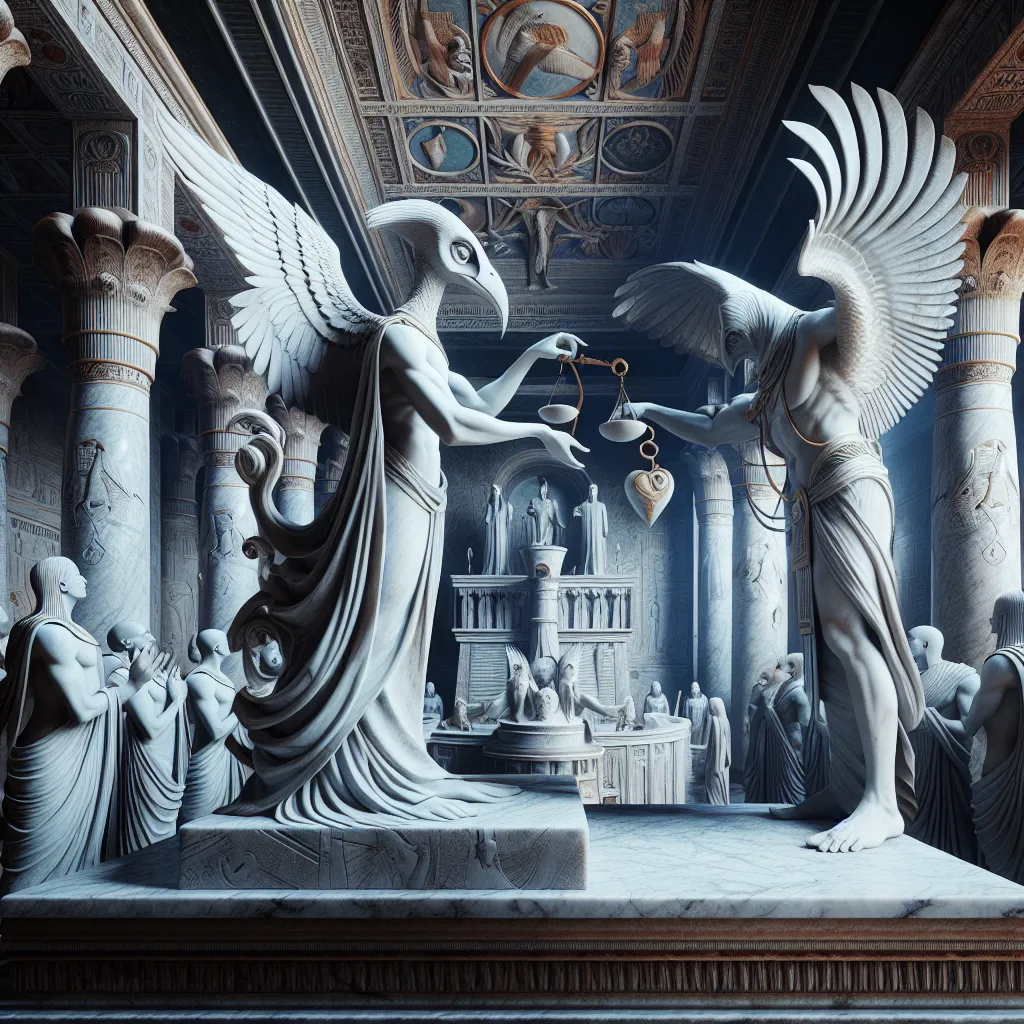
- Published on
- Authors

- Name
- You
Thoth and the Afterlife: Weighing the Heart in the Hall of Maat
The ancient Egyptian afterlife is a fascinating blend of myth, ritual, and cosmic justice, governed by the principles of Ma'at and overseen by enigmatic deities. Among these, Thoth, the god of wisdom, writing, and magic, holds a pivotal role, especially in the Weighing of the Heart ceremony—a process that determined the fate of the deceased's soul.
Thoth: The Divine Scribe
Thoth, known as Djehuty in ancient Egypt, is often depicted as a man with the head of an ibis or a baboon. His attributes include being the divine scribe, the inventor of writing, and the master of knowledge. But Thoths responsibilities transcend mere record-keeping; he is integrally involved in the afterlife, assisting in the judgment of souls.
Responsibilities of Thoth
| Role | Description |
|---|---|
| Scribe of the Gods | Recording the outcome of the Weighing of the Heart ceremony |
| Mediator | Ensuring the balance of Ma'at through fairness and truth |
| Magician | Utilizing sacred words and spells to protect and guide souls |
The Hall of Maat: Center of Judgment
The Hall of Maat is where the deceased's heart would be weighed against the feather of Ma'at, the goddess of truth and justice. Ma'at personifies order and balance, fundamental principles that the ancient Egyptians believed governed the universe.
The Process of the Ceremony
- Presentation of the Heart: The heart of the deceased is presented to the gods.
- Weighing Against the Feather: Anubis, the jackal-headed god of mummification and the afterlife, places the heart on a scale, balancing it against Ma'at's feather.
- Thoth’s Role: Thoth meticulously records the outcome. If the heart balances with the feather, the soul is deemed pure and is allowed to enter the afterlife. If not, it is devoured by Ammit, a creature with the head of a crocodile, the body of a lion, and the hindquarters of a hippopotamus.
Symbolism and Mystical Insight
- Heart: Represents the moral and ethical essence of the individual.
- Feather of Maat: Signifies truth and purity—an instrument to measure deviation from these ideals.
- Scales: They are not just physical devices but a reflection of cosmic balance and justice.
Scientific and Mystical Synthesis
Modern science provides insight into the psychological impact and social control such rituals had on ancient societies. The Weighing of the Heart functioned as both a moral compass and a method for maintaining social order.
Elements of Psychological Influence
- Ethical Internalization: The fear of judgment after death encouraged individuals to lead morally upstanding lives.
- Collective Consciousness: Shared beliefs in Ma'at ensured communal harmony.
Connection to Natural Laws
Quantum physics and the concept of energy conservation resonate with the ancient practice. Just as energy can neither be created nor destroyed, the essence of Ma'at's feather suggests an eternal equilibrium—balance governing both the cosmos and human actions.
Conclusion
Thoths involvement in the Weighing of the Heart ceremony goes beyond mere myth. It underscores a sophisticated understanding of morality, justice, and cosmic balance, reflecting a blend of advanced scientific principles and mystical wisdom. As we delve deeper into these ancient rituals, we reveal timeless truths about human nature and the eternal quest for balance and harmony.
Recommended Reading
- "Egyptian Book of the Dead": Translation and commentary by E.A. Wallis Budge
- "The Wisdom of Thoth": Analytical insights into Thoths role in Egyptian lore by Geraldine Pinch
- "Maat: The Moral Ideal in Ancient Egypt" by Maulana Karenga
By studying these ancient practices, we embark on a journey not just through history, but through the very essence of what it means to live a balanced and truthful life.
